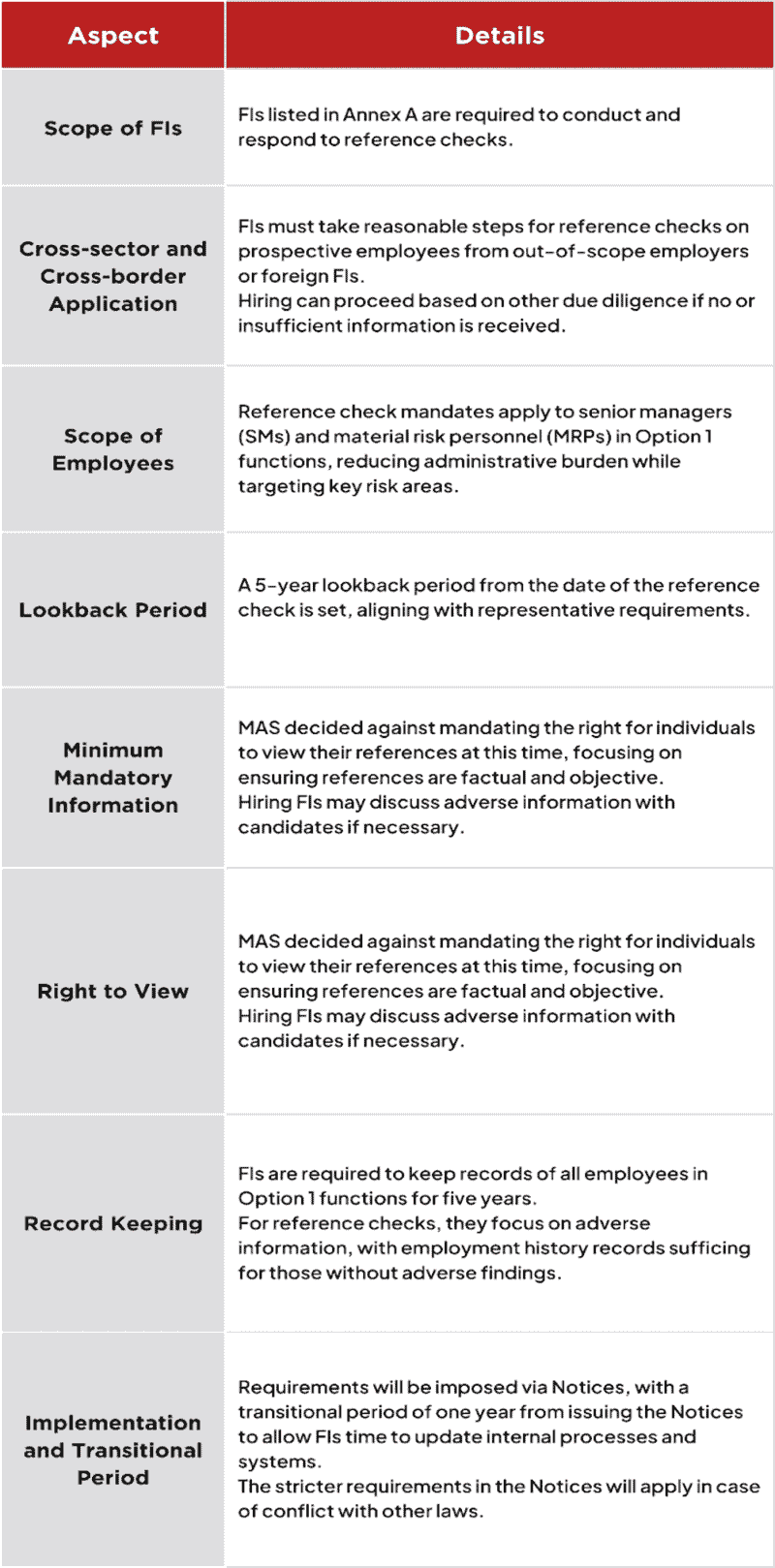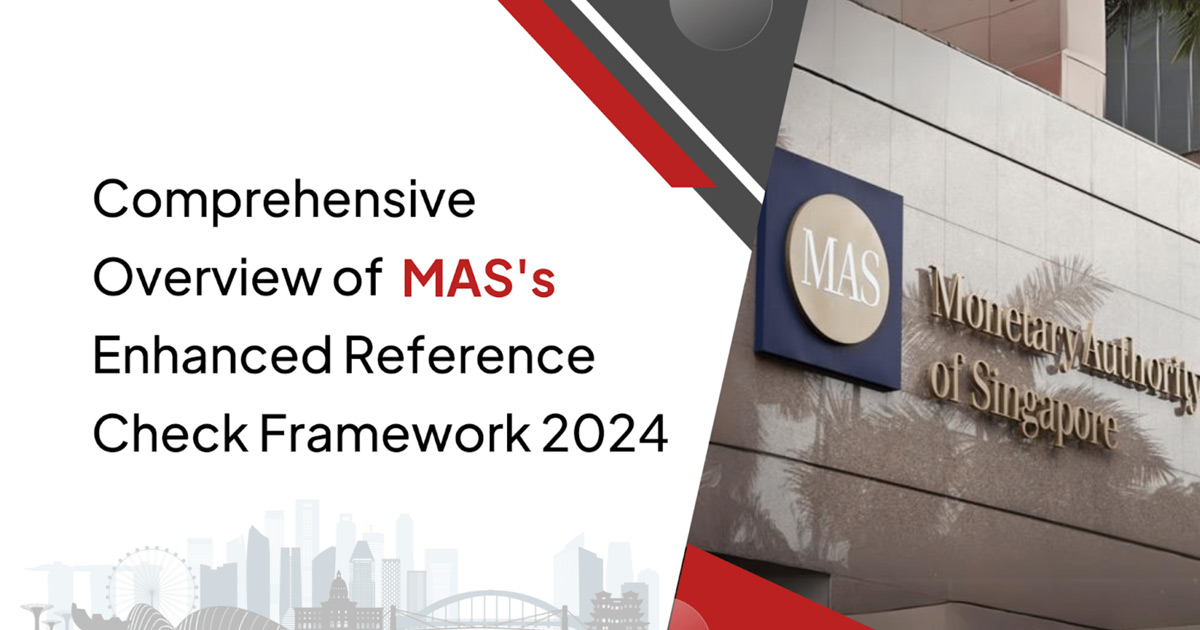Inside This Article:
In pursuit of fortifying the integrity of the financial sector, the Monetary Authority of Singapore (MAS) launched a critical initiative in May 2021. This initiative sought to introduce rigorous reference check requirements for financial institutions (FIs) to curb the problem of “rolling bad apples.” These are individuals who, after engaging in misconduct at one firm, seek employment at another without disclosing their past indiscretions.
On 12 December 2023, the Monetary Authority of Singapore (MAS) revealed its decision to move forward with the proposal to mandate reference checks within financial institutions (FIs) following the conclusion of the consultation period on 25 June 2021. In light of this, MAS has detailed several vital areas:
- Scope of FIs
- Cross-sector and Cross-border Application
- Scope of Employees
- Lookback Period
- Minimum Mandatory Information
- Right to View
- Record Keeping
- Implementation and Transitional Period
A. Scope of FIs
- Applicability Confirmation:
- Problem: Requests to confirm which financial institutions must adhere to reference check requirements.
- Response: MAS mandates this for institutions listed in Annex A.
- Outsourcing Feasibility:
- Problem: Queries on the possibility of outsourcing reference checks.
- Response: Allowed, but institutions remain responsible for compliance.
- Compliance Accountability:
- Problem: Concerns over who ensures the thoroughness and compliance of reference checks.
- Response: Institutions are accountable, even when outsourcing.
- Dealing with Adverse Findings:
- Problem: How to proceed if negative information is found.
- Response: Institutions must assess negative findings carefully and, if hiring, implement extra oversight.
- Supervision and Documentation:
- Problem: Questions about MAS’s role and the documentation needed to determine candidate suitability.
- Response: MAS can review documentation; institutions must prove that the candidate suits MAS’s satisfaction.
B. Cross-sector and Cross-border Application
- Applicability Confirmation:
- Problem: Requests to confirm which financial institutions must adhere to reference check requirements.
- Response: MAS mandates this for institutions listed in Annex A.
- Checking References for External and Foreign Employers:
- Problem: Uncertainty around reference checks for candidates from non-listed or foreign financial institutions.
- Response: FIs must attempt these checks, showing due diligence even when responses are lacking or insufficient.
- Proceeding Amidst Inadequate Reference Information:
- Problem: How to proceed when reference checks yield insufficient information.
- Response: FIs can hire based on other due diligence outcomes if they’ve made reference check attempts.
- Expectations for Cross-Sector and International Checks:
- Problem: Need for guidance on handling checks with out-of-scope or foreign employers, including within the same group.
- Response: FIs should pursue references from these employers, documenting efforts for follow-up. Information sharing should be relevant when responding to out-of-scope requests.
- Internal Group Movements:
- Problem: Whether internal group transfers require new reference checks.
- Response: No need for formal checks if hiring FIs have access to the candidate’s existing records, but they must use this information to assess suitability.
C. Scope of Employees
- Employee Scope for Reference Checks:
- Problem: Balancing coverage and workload in deciding who needs reference checks.
- Response: MAS opts for a focused approach, mandating checks for senior managers (SMs) and material risk personnel (MRPs) in crucial roles, reducing administrative burden while addressing key risk areas.
- Concerns Over Broad Application:
- Problem: High administrative workload from comprehensive employee coverage.
- Response: Limiting the scope to SMs and MRPs to ease workload without compromising risk management.
- Application to Varied Employment Types and Promotions:
- Problem: Whether reference checks apply to promotions and non-full-time roles.
- Response: Checks required for new SM or MRP hires, including part-time and contract roles, but not for internal promotions.
- Outsourced Functions:
- Problem: Need for checks on employees of third-party service providers.
- Response: Outsourced roles within the mandated scope must adhere to the FI’s hiring standards.
- General Insurance Agents:
- Problem: Suggestion to exempt general insurance agents.
- Response: Insurers must conduct checks on agents due to mis-selling risks, ensuring uniformity in application.
D. Lookback Period
- Lookback Period Agreement and Queries:
- Problem: Support for a 5-year look back with requests for clarification and suggestions for alternative timelines.
- Response: MAS sets a 5-year lookback period from the reference check’s date, keeping it consistent across the board.
- Record Retention Mismatches:
- Problem: Existing record retention policies may not comply with the 5-year requirement.
- Response: FIs facing record gaps should communicate limitations and adjust retention policies to ensure 5-year compliance.
- Limit on Previous Employers:
- Problem: Proposals to limit reference checks to a fixed number of past employers to reduce workload.
- Response: MAS declines this approach to prevent evasion of scrutiny through frequent job changes.
- Dealing with Incomplete References:
- Problem: Strategies for handling incomplete reference data due to retention policy discrepancies.
- Response: FIs must report data gaps and revise their processes to align with the 5-year requirement, ensuring candidates’ fitness and propriety.
E. Minimum Mandatory Information
- Content of Reference Checks:
- Problem: Uncertainty over the legal risks in sharing details about ongoing investigations and disciplinary actions.
- Response: MAS specifies excluding planned disciplinary actions not undertaken and requiring information on ongoing investigations only if the individual is aware and the subject.
- Timeline for Response:
- Problem: Most support for responding to reference checks within 21 days, but queries on handling sensitive information.
- Response: MAS confirms a maximum response time of 21 days, advising FIs to ensure compliance with legal and statutory obligations and avoid disclosure of sensitive or irrelevant personal details.
- Balanced Scorecard Grades and Persistency Ratios:
- Problem: Suggestions to exclude these metrics for non-relevant roles.
- Response: MAS agrees to adjust the mandatory information scope, emphasizing relevance (e.g., for financial advisory roles).
- Standardization Request:
- Problem: Requests for a standardized template for reference check requests.
- Response: MAS encourages FIs to collaborate with industry associations to develop templates to ensure information relevance and factual accuracy in checks.
F. Right to View
- Granting Viewing Rights to References:
- Problem: Mixed opinions on allowing individuals to view their references due to legal risks, potential disputes, and operational challenges.
- Response: MAS currently decides against mandating viewing rights, emphasizing that references must remain factual and objective.
- Promoting Fairness and Objectivity:
- Problem: How to maintain fairness and objectivity in the reference check process.
- Response: MAS suggests that hiring FIs could involve candidates in discussions, especially to clarify any adverse information found, aligning with principles of fairness and objectivity.
G. Record Keeping
- Record-Keeping Requirements:
- Problem: Support for 5-year record maintenance with concerns over workload and whether to keep records for individuals without adverse information.
- Response: MAS requires 5-year retention of adverse information for all employees in Option 1 roles, with employment history records sufficing for those without adverse information.
- Who Needs Records Kept:
- Problem: Clarification needed on record-keeping for different employee types.
- Response: MAS specifies all employees in Option 1 roles must have records kept, regardless of their employment terms, to facilitate thorough future reference checks.
H. Implementation and Transitional Period
- How to Implement:
- Problem: Requests for flexible implementation methods.
- Response: MAS chooses Notices for a uniform approach to reference checks.
- Conflicts with Other Laws:
- Problem: Worries about clashes with laws like the PDPA.
- Response: Notices will adhere to PDPA standards, superseding lesser regulations in case of conflict.
- Adjustment Time:
- Problem: Calls for more time to adapt to new requirements.
- Response: MAS grants a one-year transitional period for FIs to prepare.
Snapshot of the Discussion:
This comprehensive framework marks a pivotal step by MAS towards safeguarding the financial sector’s integrity through a balanced, well-considered approach to reference checks, reflecting careful consideration of industry feedback and practical challenges.

Conclusion
In conclusion, Rikvin is dedicated to ensuring compliance within the financial sector; we recognise the importance of MAS’s comprehensive framework for reference checks. The introduction of standardised requirements across various facets, from the scope of financial institutions and employees to the specifics of record-keeping and the implementation period, underscores a strategic approach to mitigating risks associated with “rolling bad apples.”
MAS facilitates a more transparent, accountable, and secure financial environment by aligning these mandates with existing laws, ensuring a reasonable lookback period, and clarifying cross-border applications. Our role in guiding financial institutions through this transitional period will be crucial in adapting to these changes efficiently, ensuring they meet the new standards without compromising operational efficiency or legal compliance.
Enhance your Institution's Integrity.
Implement MAS standards today.

Rikvin’s content team includes in-house and freelance writers across the globe who contribute informative and trending articles to guide aspiring entrepreneurs in taking their business to the next level in Asia.


